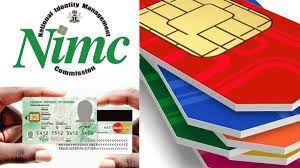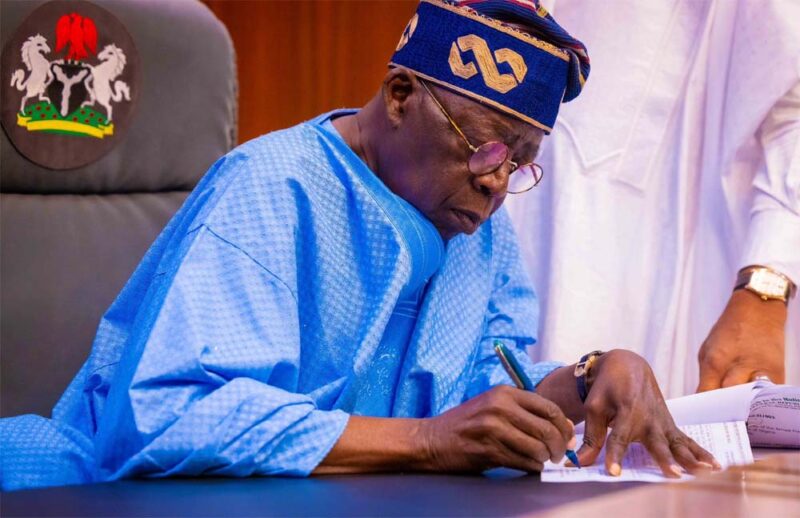News
NIN: Phone users complain over barred lines after linkage

NIN: Phone users complain over barred lines after linkage
Some telcos subscribers have complained that their phone lines have been blocked despite linking their SIM with personal national identification numbers.
According to NAN, the Nigerian Communications Commission (NCC), which regulates Nigeria’s telecommunications companies (Telcos) like MTN, Airtel, and Globacom, has told them to fully block all phone lines whose subscribers have not submitted their NINs or whose NINs have not been verified by February 28, 2024.
Additionally, the NCC said that NINs that had been submitted but not yet verified would be blocked on or before March 29, 2024.
This was also the case for NINs that had five or more lines related to them that had not yet been verified.
Additionally, if less than five lines are connected to an untrusted NIN, those lines will be banned on or before April 15, 2024.
On Tuesday night, NAN went to a lot of telecom customer service centres in Lagos and heard from customers who were upset about blocked lines at all of the stores, but especially at MTN shops.
People who signed up were mad that they could not make calls on their lines before the deadline on February 28.
Some of them said that they had already done what the NCC told them to do and linked their NINs to their SIM cards. They were shocked to find that their lines were still blocked.
A businessman named Marcel Okoh said that he got a message on his MTN line over the weekend, but he didn’t pay attention to it because he was done connecting his NIN-SIM.
Okayoh said that two days after the message was sent, he found that his SIM card had been removed, so he couldn’t use his phone to make calls or recharge it.
“The disconnection is uncalled for because I have done the needful and I should have been given time to make enquiries.”
Aisha Alao, a fashion designer who also has an MTN line, says that the operator cut her off without notice.
According to Alao, when she went to one of the MTN locations, the staff told her she needed to finish a NIN-SIM linkage.
A retired teacher named Mrs. Veronica Maduabunechukwu told NAN that she got a letter from Airtel telling her to disconnect, even though she had already finished her NIN-SIM linkage.
“The queue is still open, and I don’t see why it should be illegal.”
Another MTN user, Mrs. Chinenye Agbanusi, said that she had linked her NIN and SIM cards as early as 2020.
AGBANUSI told MTN she didn’t like how they blocked her queue even though they followed the right steps.
She also said the phone company should update its systems so that people who have already done what they need to do don’t have to deal with the same problems over and over again.
Globacom customer Miss Kanyinsola Oje said she got a message telling her to connect her SIM to NIN so she wouldn’t lose her connection.
After a few days of getting the letter, she realised that her queue was limited.
Miss Nkechi, who works at one of Airtel’s locations in Ketu, told the surveyors that customers had been coming to the office to complain about their SIM being disconnected.
Additionally, Olumide, a Globacom Agent in Ketu, said that customers had been complaining about their lines being blocked since December 2023.
He said that most of the users had said they had already finished the NIN-SIM linkage but were now having problems.
According to Olumide, the subscriber’s NIN registration name might be different from the name they used to register their SIM.
“One more problem could be that the line was given to someone else, so the name on the SIM card might still be that of the previous owner.”
In response to the complaints from customers, Mr. Funsho Aina, Senior Manager, External Relations, MTN, said that most of the banned lines were because they didn’t have enough data on them.
Aina said that it was likely that these users had finished the NIN-SIM linkage, but that the information that was recorded for NIN might not match the information that was registered for their SIM.
He said that if the data reported for NIN and SIM were different, it could affect how it was put together.
“For instance, I use Funsho to register my SIM card and Olufunsho, which is also my name, to register for the NIN.”
“Even if I do the NIN-SIM linkage, in collating by the telco, the technology might not be able to link the names to one person and the line would be disconnected until the discrepancy is corrected,” he mentioned.
However, Aina said that self-help activities could be used to fix these problems and get back together.
He told people to make a Virtual NIN (VNIN) at https://nin.mtn.ng/nin.
“On your smart phone, you can also call *996*3#.
“Select option three for Virtual NIN.” If you want to move forward, enter your NIN and your Enterprise ID, which is “109071.”
“You can also make a VNIN by dialling *346*3*your 11-digit NIN*109071#,” Aina said.
The MTN rep also said that because MTN has more subscribers than other carriers, their customers seemed to be hit more.
NIN: Phone users complain over barred lines after linkage
News
BREAKING: Tinubu Assents to 2026 Electoral Act, Sets Stage for 2027 Elections

BREAKING: Tinubu Assents to 2026 Electoral Act, Sets Stage for 2027 Elections
President Bola Ahmed Tinubu has signed the 2026 Electoral Act Amendment into law, setting the legal framework for Nigeria’s 2027 general elections.
The signing ceremony took place on Wednesday at the Presidential Villa in Abuja, with Senate President Godswill Akpabio and Speaker of the House of Representatives Tajudeen Abbas in attendance.
The new law, formally known as the 2026 Electoral Act (Amendment) Bill, was recently harmonised and passed by both chambers of the National Assembly amid debate and opposition from minority lawmakers.
The legislative process leading to the signing saw intense deliberations in both the Senate and the House of Representatives. Lawmakers constituted a joint conference committee to reconcile differences between their respective versions of the bill before transmitting the harmonised document to the President for assent. Earlier, Senate President Akpabio had indicated during an emergency plenary session that the President was expected to sign the amended bill before the end of February. That projection materialised within days.
One of the most significant changes introduced by the 2026 Electoral Act is the reduction of the mandatory notice period for general elections from 360 days to 300 days. Lawmakers explained that the adjustment is intended to give the Independent National Electoral Commission (INEC) greater operational flexibility in planning and conducting elections without breaching statutory timelines.
READ ALSO:
- Korope Drivers Shut Down Lekki–Epe Expressway Over Lagos Ban (Video)
- Kano Closes Entertainment Centres Ahead of Ramadan
- Asari Dokubo Warns Igbo Groups Against Sparking Religious Conflict in Rivers
The issue of electronic transmission of election results generated considerable debate throughout the amendment process. Under the new law, electronic transmission is permitted, while manual collation remains legally recognised, particularly in areas where technical or connectivity challenges arise. INEC retains the authority to issue detailed regulations and guidelines governing how results are transmitted and managed. Supporters argue the compromise reflects operational realities, while critics maintain that the changes may weaken transparency safeguards introduced in previous reforms.
Beyond these headline issues, the amended Act also makes adjustments to party primary timelines, candidate nomination processes, and collation procedures. It includes technical corrections across multiple clauses to improve clarity, reduce ambiguities, and strengthen administrative consistency ahead of the 2027 polls.
With presidential assent now secured, the 2026 Electoral Act becomes the binding legal framework governing presidential, National Assembly, governorship, and state House of Assembly elections. INEC is expected to review and align its regulations and operational guidelines with the new provisions as preparations intensify for the 2027 general elections.
The signing marks a pivotal moment in Nigeria’s democratic process, with political parties, civil society groups, and voters closely watching how the revised electoral framework will shape the next election cycle.
BREAKING: Tinubu Assents to 2026 Electoral Act, Sets Stage for 2027 Elections
News
Korope Drivers Shut Down Lekki–Epe Expressway Over Lagos Ban (Video)

Korope Drivers Shut Down Lekki–Epe Expressway Over Lagos Ban (Video)
LAGOS, Nigeria — Tension erupted on Tuesday along the Lekki–Epe Expressway as commercial mini-bus operators, popularly called korope drivers, staged a protest against a state-imposed ban on their operations along the corridor. The demonstration, which occurred during peak hours around the Ajah axis, caused vehicular movement to nearly grind to a halt, leaving hundreds of commuters stranded and triggering heavy traffic gridlock across adjoining routes. Eyewitnesses reported that drivers parked their buses across the carriageway, chanting and demanding the immediate reversal of the restriction.
Security operatives were deployed to restore order, and traffic flow gradually resumed after several hours of disruption.
Some of the protesting drivers said the ban threatens their primary source of income, as the Lekki–Epe corridor has historically been one of the most profitable routes for informal transport operators. “We have families to feed. You cannot just wake up and push us off the road without providing an alternative,” one driver told reporters. The operators called on the government to reconsider the policy or integrate them into the new transport structure rather than exclude them entirely.
READ ALSO:
- Kano Closes Entertainment Centres Ahead of Ramadan
- Asari Dokubo Warns Igbo Groups Against Sparking Religious Conflict in Rivers
- Bauchi Reduces Working Hours for Civil Servants During Ramadan
The Lagos State Government, however, defended the restriction, describing the protest as unlawful and disruptive to public order. Authorities explained that the Lekki–Epe Expressway has been designated as a Mass Transit and Regulated Transport Corridor under the state’s Bus Reform Initiative, aimed at modernizing public transport, improving safety, and reducing traffic chaos caused by unregulated operations.
According to Sola Giwa, Special Adviser to the Governor on Transportation, consultations were held with transport stakeholders before enforcement, and the transition was not sudden. Small vehicles such as korope buses are now expected to operate on feeder and community routes under the state’s First and Last Mile transport strategy, while high- and medium-capacity buses serve the main corridor.
The ongoing transport reform seeks to replace informal minibuses on major highways with structured, regulated services featuring larger buses and digital ticketing systems. Government officials argue that this will enhance commuter safety, improve traffic flow, and boost economic productivity along one of Lagos’ fastest-growing corridors.
Critics, however, note that informal transport remains a backbone of daily commuting for thousands of residents. Abrupt enforcement without adequate absorption of displaced drivers could exacerbate economic hardship for affected operators.
Many commuters expressed frustration over the disruption caused by the protest but also sympathized with the drivers. “It’s difficult for us because we rely on these buses every day,” said a commuter stranded at Ajah. “The government and the drivers need to find a middle ground.”
As of press time, authorities had restored calm, but the incident underscores the growing tensions between informal transport operators and the Lagos State Government’s efforts to formalize the transport system.
Korope Drivers Shut Down Lekki–Epe Expressway Over Lagos Ban
AG Baby | South East | Fashola |Tacha | Mirable | Alex Otti | Falz | Ikorodu Celine Dion pic.twitter.com/XYoVqWkVJq
— Newstrends.Ng (@Newstrends_ng) February 18, 2026
Korope Drivers Shut Down Lekki–Epe Expressway Over Lagos Ban (Video)
News
Tinubu Urges Senate to Confirm Yusuf for NAHCON, Marafa for INEC

Tinubu Urges Senate to Confirm Yusuf for NAHCON, Marafa for INEC
President Bola Ahmed Tinubu has called on the Nigerian Senate to swiftly confirm the nominations of Ambassador Ismail Abba Yusuf as Chairman of the National Hajj Commission of Nigeria (NAHCON) and Rear Admiral Jemila Abubakar Marafa (retd.) as a National Commissioner of the Independent National Electoral Commission (INEC). The move underscores the administration’s focus on strengthening leadership in key federal institutions ahead of critical national events.
In a letter to Senate President Godswill Akpabio, Tinubu stressed the urgency of filling the leadership gap at NAHCON, following the resignation of the previous chairperson. Ambassador Yusuf, a seasoned diplomat and former Nigerian envoy to Türkiye, brings significant international experience and administrative expertise, making him well-positioned to lead the commission in managing future Hajj operations efficiently.
READ ALSO:
- Galatasaray Stun Juventus 5–2 in UEFA Champions League
- Vinicius Jr’s Wonder Goal Gives Real Madrid Victory Over Benfica
- Trump’s Executive Order Halts US Aid, 250,000 Lives Affected in Yobe
For INEC, the nomination of Rear Admiral Marafa (retd.) is aimed at reinforcing the commission’s leadership ahead of the 2027 general elections. Representing Adamawa State, Marafa’s confirmation would bolster electoral governance, ensuring transparency, credibility, and smooth conduct of national elections.
Both nominations were formally read during Senate plenary and referred to the relevant committees — the Committee on Foreign Affairs for NAHCON and the Committee on Electoral Matters for INEC — with directives for expedited review and reporting within one week.
The President emphasized that having qualified and experienced leadership in statutory bodies like NAHCON and INEC is essential for national stability, and Senate confirmation will enable the nominees to assume office with full legal authority and mandate.
Tinubu Urges Senate to Confirm Yusuf for NAHCON, Marafa for INEC
-

 News1 day ago
News1 day agoSaudi Arabia Confirms Sighting of Ramadan Crescent, Fasting Begins Wednesday
-

 metro1 day ago
metro1 day agoLagos Woman Shares Ordeal After Alleged Rape, Sparks Nationwide Outcry
-

 metro2 days ago
metro2 days agoUS Freezes Assets of Eight Nigerians Over Boko Haram, ISIL, Cybercrime Links
-

 News1 day ago
News1 day agoRamadan Begins in Nigeria as Sultan Confirms Crescent Sighting
-

 Entertainment2 days ago
Entertainment2 days agoMystery in Lekki: Police Probe Death of Two Nollywood Crew Found Lifeless in Parked Car
-

 metro2 days ago
metro2 days agoTerror in Lagos Traffic: Cutlass Gang Unleashes Mayhem on Mile 12–Ketu Road
-

 Auto2 days ago
Auto2 days agoAppeal Court Ruling on VIO Limited to Abuja, Not Lagos — LASG
-

 News2 days ago
News2 days agoTeargas, Chaos at EFCC as El-Rufai’s Supporters Clash with Security Operatives











